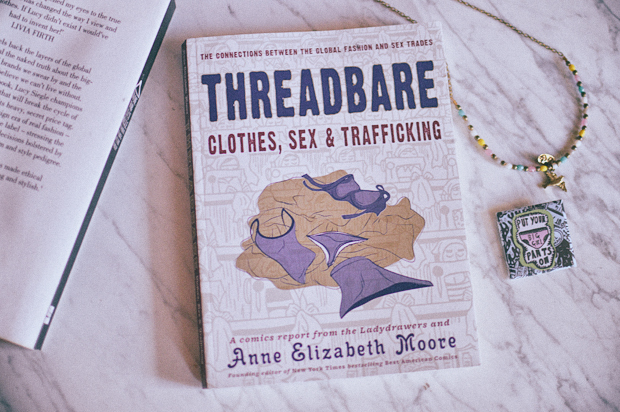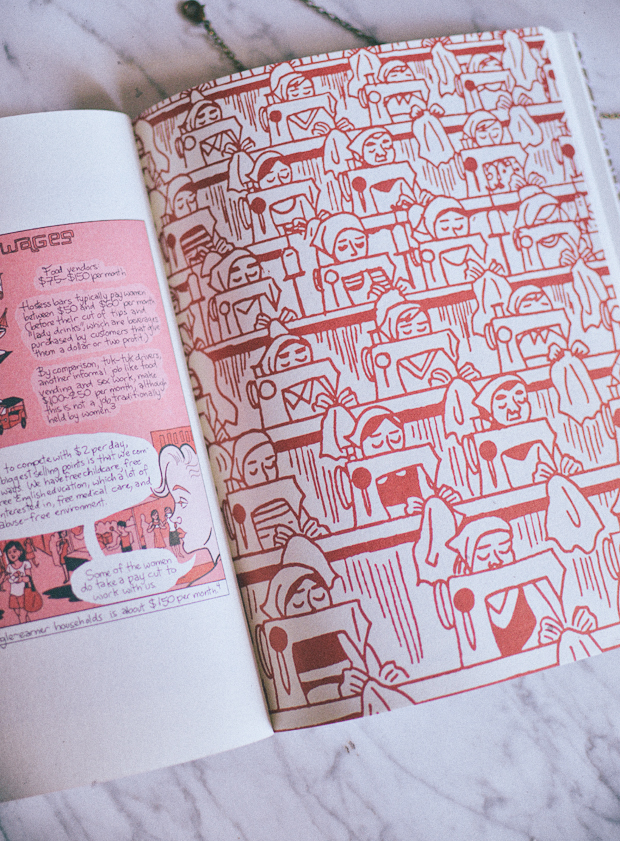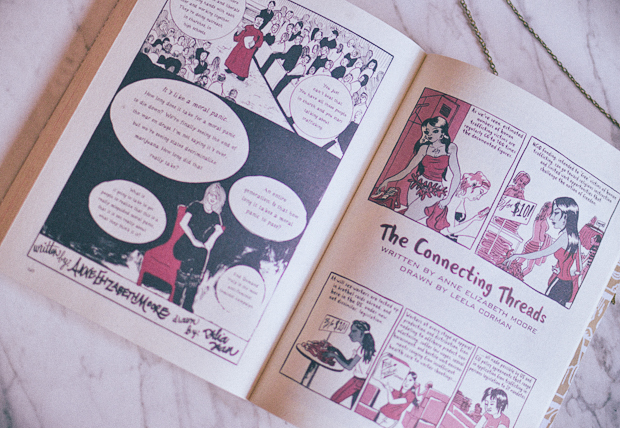It seems a little bit over the top to point this out right at the start of this post but I honestly believe it’s true; you can’t call yourself a feminist if you believe in fast fashion.

This belief hit me whilst reading “Threadbare: Clothes, Sex & Trafficking” by Anne Elizabeth Moore. It’s an illustrated non-fiction comic all about the fashion industry and how it links in with sex work and trafficking. It sounds like a pretty heavy topic, but it was possibly one of the easiest ethical/anti-fast fashion reads I’ve finished so far, and for those of you who prefer something a little more attractive to the eyes, then I’d definitely recommend it (however I will point out – it does have fairly small text to read).
The statistic that struck me with this realisation was this – 1 in 7 women worldwide, work in the fashion industry. The tricky thing about feminism is how it is deemed to be only related to women and feminine issues, when as we should all know by now, it’s about equality, and the only way we can reach gender equality and an equal balance between men and women, is by working on the imbalance of which is mainly weighing down on, well, women.
So seeing as a seventh of the female population in the world are somewhat responsible for the fashion industry, it would seem a bit absurd to not think about how it affects those people, wouldn’t it?

One of the main issues surrounding fast fashion and the industry as a whole is the problem surrounding working conditions. 80% of garment workers are women. According to the book “To Die For” by Lucy Siegle, if we break down the price of a £4 (ASDA) t-shirt, £1.18.5p goes to the supplier; £2.80 goes straight to ASDA as profit and the garment worker (most probably a woman) receives just 1.5p.
That’s 1.5p per what could possibly be 200 garments per day (roughly £4 a day), in a factory with poor safety regulations. In fact, 60% of factories in Bangladesh are structurally unsound according to a 2013 study, which makes the Rana Plaza disaster even more tragic, because it would be so easy for it to happen again.
Upon reading more about feminism and fast-fashion, I read fellow blogger Jen’s post about her thoughts, and her point about clothes plastered with feministic slogans and messages of empowerment really raised a great question; how can we be buying these clothes that promote female empowerment that cost as much as a coffee at Starbucks, when the people making them can barely afford to live and make these clothes for us?
How can we say we’re feminists when we’re supporting companies that don’t have any interest in the women (some of which are in their teens) that they employ and the situations that they are in?

The answer is, we simply can’t. If feminism is about bringing equality to women, then we can’t call ourselves feminists if we’re still supporting a cycle and an industry that still promotes inequality. It doesn’t matter what a brand is doing on the surface. It doesn’t matter what natural beauty campaigns they’re running, or what slogans are on those t-shirts.
At the end of the day, if they didn’t have the garment workers in the first place, then they wouldn’t have their company – we wouldn’t have our clothes and our wardrobes full of outfits. We as women, as men, and as humans who need to prolong the earth we stand on – cannot call ourselves feminists if we live with the mindset that this is okay.
In line with that, one of my favourite parts of “Threadbare” and actually the page that featured that slap-in-the-face statistic, was this –
‘So if you want to support job opportunities for women in developing nations, don’t shop at the mall.’

If you want to call yourself a feminist and support one of the biggest industries in the world, and a seventh of the female population (cisgender/transgender – unfortunately there isn’t a clear statistic for that number, which would bring me onto a whole other topic of discrimination), then don’t support what is causing the most damage. Or like I’ve said many times before; be conscious. Hold retailers responsible.
So yes, I am a feminist, because I’m doing my part to avoid supporting companies who don’t value their workers and aren’t doing their part to create a fairer industry. Are you?








6 Comments
Really interesting piece (which I found out about on the #ethicalhour Twitter chat last night). I was talking about this issue with someone recently who said they felt if they didn’t buy from the high street then maybe these women wouldn’t have any work at all which might be worse. They felt the thing to do was to be a customer and constantly ask questions (loudly) of the staff in front of other customers and to contact head office with requests for information on their trade practices etc. I don’t really shop for clothes much but I do feel that many of the big retailers have the power to really drive social change and customer pressure can be a great way to do that. As a blogger I like you calling this out. As a retailer, I have to find less controversial ways to engage and encourage people into buying ethically. I think there are a number of retailers out there trying to make it easier for people to buy things that have a more positive impact on society and the world. #ethicalhour is a pretty good pace to find some of them.
Aww thank you for such a wonderful comment and for taking a read! I’ve definitely felt that way; in fact, with my family, that seems to be their biggest concern from learning about the issues, the idea that the women (and men, and even children) who work in factories would lose their jobs if we boycott. I totally understand this, but unfortunately (and fortunately) this won’t happen unless it was a drastic amount of people making a change. There are lots of reasons why people shop on the high-street, the main one for this day and age being the fact it is affordable. Not everyone can afford to find what they need elsewhere, whether that’s because of their budget or because of their size etc.
So, these people won’t lose their jobs because, in one way, there is a need for the high-street; people need affordable clothes when they are necessary items. In fact, the biggest reason for them losing their jobs currently is because of brands saving themselves. It’s something I’m reading in “To Die For by Lucy Siegle” – brands cut and run from factories if they are found out to be unsafe etc. They blame it on not seeing the problems in the first place and move on to another factory which is so-say ‘better’. Those people may lose their jobs, all because a brand isn’t just owning up to their responsibility and helping improve things. IMPROVE is a very important word and is something we should all focus on. It’s not about boycotting, cutting and running – it’s about making changes and shifts, and improving the way the system works, which in the end, will change it overall so there is no need to boycott – if that makes sense? I totally understand and even appreciate how as a retailer you can’t be quite as in your face about things, in fact, that’s what usually throws me off from a brand, so exactly – connecting and finding people with the same mindsets is going to work wonderfully.
WOW – what a ramble, which hopefuly makes sense in some shape or form. I love talking to people about these things, so once again – THANK YOU for a great comment!
This is an interesting read. Love it!
Thanks Jade! 🙂 x
Thanks so much for linking me. This is a really well-written post, well done it’s not an easy topic to cover. I loved reading Threadbare as you said it manages to cover really heavy topics and still be an easy read.
No worries at all! Thanks so much! Your post was just as (if not even more) brilliant! 🙂